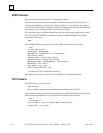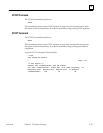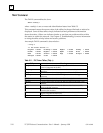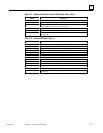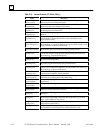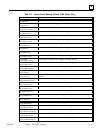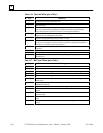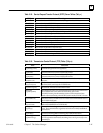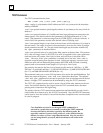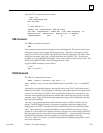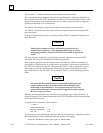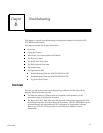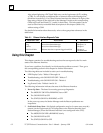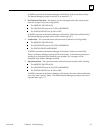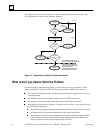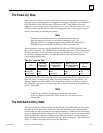
5
5-42 TCP/IP Ethernet Communications User’s Manual – January 1996
GFK-1004B
TEST Command
The TEST command has the form:
TEST { <node> | ALL } [<cnt> [<sch> [<len> [<pat>]]]]
where <node> is a destination MAC address and ALL is a synonym for the broadcast
address, ffffffffffff .
<cnt> is an optional number specifying the number of test frames to be sent, which de-
faults to 1.
<sch> is an optional number of 10 millisecond time intervals between consecutive test
frame outputs. The default value for this parameter is 50 (500 milliseconds or 1/2 se-
cond). This parameter’s value can range from 0 to 7fffH (32767), or about 6 minutes. A
value of 0 for this parameter results in the default value of 50 being used.
<len> is an optional length of user data in the test frame which defaults to 0 (no data in
the test frame). The range of values for this parameter is from 0 to the value of configu-
ration parameter lmaxdb - 16. The test frame data length may be further modified by
the <pat> parameter, as described below.
<pat> is an optional value to be used as the data pattern in the user data. This parame-
ter’s value can range from 0 to ffH (255). If a value is supplied for the <pat> parameter,
each test frame will contain <len> bytes of data, and each byte of test data will be
<pat>. However, if the <pat> parameter is omitted and a non-zero <len> value is
supplied, a special testing byte sequence is used. In this test sequence, successive test
frames are sent with an alternating data pattern (00H, 55H, aaH, ffH, and a counting
pattern) and an incremental frame length of 1 byte up to <len> bytes.
For example, the data for the first six test frames would consist of: 00H (len = 1), 55H
55H (len = 2), aaH aaH aaH (len = 3), ffH ffH ffH ffH (len = 4), 00H 01H 02H 03H 04H
(len = 5), and 00H 00H 00H 00H 00H 00H (len = 6).
This command causes one or more LLC test frames to be sent to the specified address. Test
frames are output at frequency <sch> until <cnt> frames have been sent. The optional
< len> and <pat> parameters can be used to specify the form of user data sent on the test
frames. A lengthy TEST command can be terminated by using the STOPT command.
The TEST ALL command can be used to return a list of all the other stations on the net-
work. For the MAP Interface, the output from the TEST command shows the token
passing order of stations in the logical ring.
The results of the last TEST command are maintained until the Modify security level is
exited (either by a timeout or by the LOGOUT command). Also, the REPORT command
can be used to view the results of a test which has been completed or the current results
of a test in progress.
Caution
Care should be exercised in invoking the TEST command on a
network in a production environment. Invoking the TEST command
increases the load on all nodes, especially the initiating node. Be
especially cautious if you are using values of <sch> smaller than the
default, or values of <len> larger than the default. Also, be careful if
you are using the ALL synonym, which broadcasts to all nodes in the
network.



